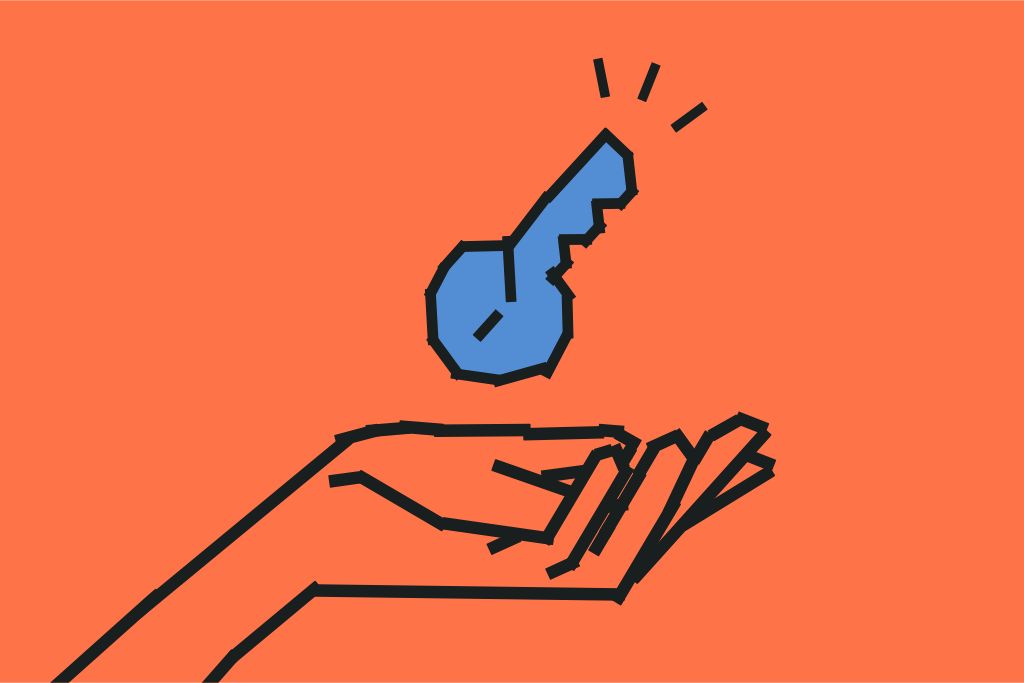How much of your own money do you need to buy a house as a starter?
As a starter, you need on average 5% to 6% of the purchase price in your own money. Not all costs can be co-financed with your mortgage, so you pay part of it yourself. Think of notary fees, transfer tax and an architectural inspection. Are you buying a house worth, say, €385,000? Then that comes down to about €19,000 to €23,000 of your own contribution.
Suppose you are indeed buying a €385,000 starter home. That amount corresponds to what first-time buyers paid on average for a home in the first quarter of 2025, according to the Land Registry. So in that case, you need a good amount of savings. And that's still without overbidding, remodeling or buying furniture for your new home.

What expenses should you pay with your own money?
You pay with your own money all the additional costs that you are not allowed to co-finance with your mortgage. Think of buyer's costs, the National Mortgage Guarantee, an architectural inspection or costs for your estate agent. These costs are in addition to the purchase price of your house. The mortgage cannot exceed 100% of the house value, so you have to contribute part of it yourself.
Want to know what costs you can expect when buying your first home? Below is a handy overview.
Additional costs for which you need your own money
- Transfer tax
- Notary fees
- Appraisal fees
- Building inspection
- Mortgage advice and brokerage fees
- Bank guarantee or deposit
- Brokerage fees
- National Mortgage Guarantee (NHG)
- New furniture, moving or remodeling
{{cta}}
1. Transfer tax
When buying an existing home, you pay transfer tax. Usually this is 2% of the purchase price. Starters under 35 often pay no tax since January 1, 2021, thanks to the starters exemption. The purchase price of your home must be below the limit of €555,000. Is your house more expensive? Then this advantage is no longer available. You always pay the cost of transfer tax out of your own pocket.
2. Notary fees
Once you have found your dream home, the mortgage deed and the deed of delivery must be recorded. This is done by a notary. You pay between €900 and €2000 for this. These costs are not reimbursed by the mortgage lender and are therefore covered by your own resources.
3. Appraisal fees
An appraisal report costs €850 at homeup. You need this report to determine the market value of the house. An appraisal report is mandatory if you want to take out a mortgage. You are not allowed to co-finance this cost, so you pay it with your own money.
4. Building inspection
An architectural inspection costs €450 at homeup. It provides insight into the condition of the house and helps you discover hidden defects in time. This is wise to have it done on an existing house or if you want to bid faster than other buyers.
5. Mortgage advice and brokerage fees
Do you have your mortgage arranged through an advisor? Then the average price for this is between €3000 and €3500 in advisory and brokerage fees. This falls under your financial obligations when buying a house and cannot be co-financed.
6. Bank guarantee or deposit
The seller often requires a deposit of 10% of the purchase price. Can't put that in right away? Then arrange for a bank guarantee or a mortgage certificate. The costs for a bank guarantee are usually between €250 and €500 and you pay out of your own funds.
7. Brokerage fees
As a starter, a buying agent is your personal bargaining chip. They will help you make an offer, compare homes, and sift through difficult documents. The cost of a buying agent is usually between €2500 and €4000, which you pay out of your own pocket.
Want to hire a real estate agent who specializes in helping first-time buyers? Then homeup is the buying agent for you, because we only help starters find a home. But what do you get in return? Peace of mind, time savings and a greater chance of finding your dream home. Especially in a market where you often have to bid or move quickly, a buying agent is not a luxury, but a smart move.
8. National Mortgage Guarantee (NHG).
As a starter, NHG is a smart move for security: for a contribution of only 0.4% of your mortgage amount, you get a safety net in case of unexpected financial setbacks (think unemployment, divorce or disability). Thanks to this guarantee, you are stronger when you take out your mortgage, and you often get a more favorable interest rate in return.
The NHG limit for 2026 has been set at €470,000 and increases to €498,200 if you co-finance energy-saving measures. This is not the purchase price of your home, but the total mortgage amount. This means that with NHG you have more room to borrow and therefore more opportunities to buy your first home.
9. New furniture, moving or remodeling
Are you buying a new construction or existing home without flooring, curtains or kitchen? Then you will have extra costs for furnishing and odd jobs. These costs fall outside the mortgage and you have to pay them yourself.

Why do you need your own money as a starter?
You need your own money because you cannot co-finance all costs with your mortgage. Your mortgage covers the full value of your home. Anything above that amount, such as buyer's fees, an architectural inspection, closing costs and notary fees, you pay yourself. Therefore, the total costs of buying a house are always higher than the purchase price you see online.
When you buy a house for sale, you can never get a mortgage for more than the market value of the home. Sometimes the asking price is higher than what the house appears to be worth in the appraisal report. You can't borrow that part. You have to put it in yourself. For a starter, that often feels like a big hurdle, because you don't yet have a surplus value from a previous home.
Rising home prices make this effect even more obvious. In popular places, chances are you will have to bid more than the purchase price. You pay that overbid amount entirely from your own resources. You won't get it borrowed through the mortgage, even if your income is high enough to cover the monthly expenses. That's why saving for your first home is so important.

When do you qualify for start-up schemes or exemptions?
You are eligible for starter schemes if you buy your first home, are under 35 years old and within the appropriate house price range. The main benefits for first-time buyers are transfer tax exemption, the National Mortgage Guarantee and, in some municipalities, a start-up loan. These schemes lower your monthly expenses and ensure that you need less of your own money when buying a home.
These schemes make buying your first home much more accessible. They lower the buyer's cost, your monthly expenses and the amount you need to save upfront. Especially the starter exemption and NHG give starters more opportunities in a market with high prices.
Want to know if you qualify for these benefits? Then take a look at the amount of a starter's exemption, the NHG limit or read the full explanation of the starter schemes when buying a house. You will then know exactly which scheme suits your situation and how much money you can save.

Putting in as little of your own money as possible with homeup
As a starter, you often put in less of your own money when you have a savvy buying agent by your side. With homeup, you first calculate how much money you need for your first home and then we look at how you can keep the buyer's fees and other additional costs as low as possible. This way, you increase your chances of actually completing the purchase of a house, without unnecessarily sacrificing your savings.
homeup doesn't just look at the purchase price, but the whole picture. We look at the market value, what the seller wants, how much the mortgage lender can let you borrow based on your income and what your maximum mortgage is. That way we make sure the purchase price you agree on matches the home value you're allowed to borrow, so you have to fill in as little difference as possible with your own money.
How homeup helps you put in less of your own money
- Smart bidding at the right price. We help you make an offer that matches market value. You avoid going much higher than necessary, while still remaining attractive to the seller. This keeps the difference between purchase price and appraised value smaller and you need less of your own money to fill the gap.
- Making the most of schemes and exemptions. We look at whether you are eligible for the starter's exemption from transfer tax and whether a mortgage with National Mortgage Guarantee suits you. This will reduce your buyer's costs and monthly expenses. That may feel technical, but the effect is very simple: you need less money from your own savings.
- All additional costs transparent in advance. Think of the mortgage deed, title deed, appraisal, architectural inspection and compensation for notary fees. We provide you with a clear overview so that you know exactly which of the above costs you will be paying yourself. You then know in advance how much of your own money you will need and what you can save on.
- Strategy by home type. Whether you have your eye on an existing home or a new construction, the total cost is different. With new construction, construction interest and finishing costs come into play; with existing construction, an architectural inspection or extra work afterwards are more likely. We translate that into a concrete amount of equity for you.
- Calculation example for your situation. Instead of a standard example, we look at your income, savings and wishes. We calculate how much own money you need for a realistic purchase price in your area. This way you can see exactly how much money you need to save and which next step is logical.
With homeup as a buying agent, you are stronger than other buyers, often put in less of your own money and avoid costly misses when buying a home. Want to know how much of your own money you really need and how much you can save with a smart strategy? Then sign up for our free purchase broker service and find out what's possible for your first home.
{{cta}}



